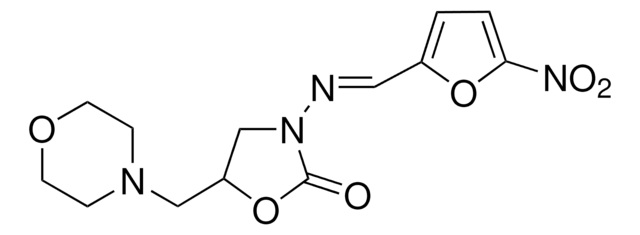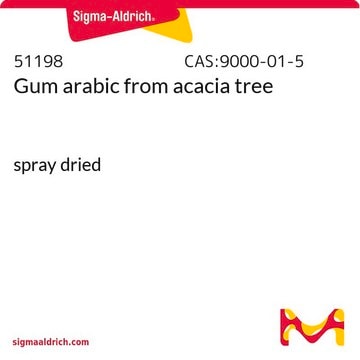Recommended Products
biological source
plant (Astragalus gummifer)
Quality Level
form
powder
color
beige
solubility
H2O: 20 mg/mL
storage temp.
room temp
Looking for similar products? Visit Product Comparison Guide
General description
Tragacanth is a gum commonly found in the sap of various Middle Eastern legumes. It is commonly used as freezing-embedding medium for tissue preservation.
Application
When mixed with water, tragacanth yields a colloidal hydrosol. The bassorin fraction (which consists of approx. 60-70% of the compound) swells to form a gel. This swelling gives the gum tragacanth the ability to form thick, viscous dispersions and pastes. It is an effictive emulsion stabilizer.
Other Notes
A complex mixture of polysaccharides including tragacanthin and bassorin.
To gain a comprehensive understanding of our extensive range of Polysaccharides for your research, we encourage you to visit our Carbohydrates Category page.
Storage Class Code
11 - Combustible Solids
WGK
WGK 2
Flash Point(F)
Not applicable
Flash Point(C)
Not applicable
Personal Protective Equipment
dust mask type N95 (US), Eyeshields, Gloves
Certificates of Analysis (COA)
Search for Certificates of Analysis (COA) by entering the products Lot/Batch Number. Lot and Batch Numbers can be found on a product’s label following the words ‘Lot’ or ‘Batch’.
Already Own This Product?
Find documentation for the products that you have recently purchased in the Document Library.
Customers Also Viewed
A Hagiwara et al.
Food and chemical toxicology : an international journal published for the British Industrial Biological Research Association, 30(8), 673-679 (1992-08-01)
Tragacanth gum was administered at dietary levels of 0 (control), 1.25 and 5.0% to groups of 50 male and 50 female B6C3F1 mice for 96 wk after which all animals were maintained on a basal diet without tragacanth gum for
Majid Saeedi et al.
Acta pharmaceutica (Zagreb, Croatia), 60(3), 339-348 (2010-12-08)
Mucilage extracted from Plantago psyllium seeds was evaluated for inertness and safety parameters. The suitability of psyllium mucilage for a pharmaceutical binder was assessed in paracetamol tablets. Properties of the granules prepared using different concentrations of psyllium mucilage was compared
J Rahimi et al.
Journal of dairy science, 90(9), 4058-4070 (2007-08-19)
The effect of different concentrations of gum tragacanth on the textural characteristics of low-fat Iranian White cheese was studied during ripening. A batch of full-fat and 5 batches of low-fat Iranian White cheeses with different gum tragacanth concentrations (without gum
A Shimotoyodome et al.
Biofouling, 22(3-4), 261-268 (2007-02-13)
The aim of this study was to investigate materials which reduce saliva-promoted adhesion of Streptococcus mutans onto enamel surfaces, and their potential in preventing dental biofilm development. The effects of hydroxyapatite (HA) surface pretreatment with hydrophilic polysaccharides on saliva-promoted S.
T M Wieland et al.
Journal of animal science, 71(7), 1863-1868 (1993-07-01)
Four trials were conducted using 86, 24-h-old pigs to evaluate the utilization of medium-chain triglycerides (MCT). Effects of emulsification and amount of MCT fed were examined. After a 4-h period during which feed was withheld, pigs were force-fed MCT (containing
Our team of scientists has experience in all areas of research including Life Science, Material Science, Chemical Synthesis, Chromatography, Analytical and many others.
Contact Technical Service











